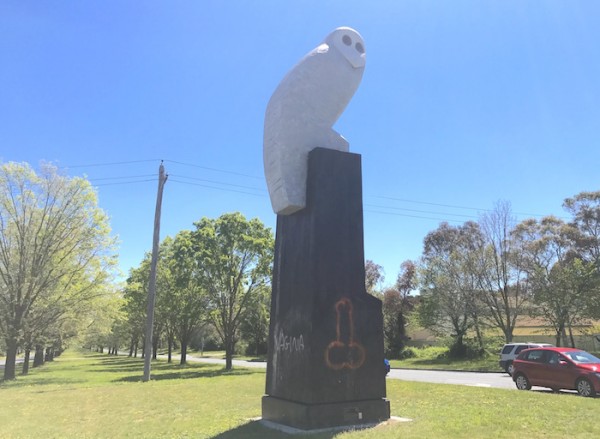
Our regular Tuesday columnist, former Canberra Liberals MLA Greg Cornwell, is back. In his first column for 2017, Greg argues our justice system should tailor punishments to fit the crime, so that, for example, graffiti vandals would be required to clean up the offending paintwork under supervision, thus gaining a better understanding of the impact of their crime.
In late December 2016 two unrelated crimes occurred in Canberra: someone graffiti-ed the plastic on the Deakin-Yarralumla bridge over Yarra Glen, which took two men a day to clean off, and someone else ignited a van carrying several gas cannisters outside the headquarters of the Australian Christian Lobby, again in Deakin.
Simultaneously an article appeared urging the world to either get in and do a thorough job in the Middle East or get out altogether.
Why doesn’t our ACT justice system do the same?
Our police force do their best but as soon as the miscreant is before the courts’ bleeding hearts, many on the bench itself appear to plead not for justice but for compassion.
Often it seems serious crimes are dealt with by the gentle rebukes of community service orders. Because we do not always learn the full story, it is difficult to judge the effectiveness and the justification for this sentence. Or even if it is carried through. Memo to Assembly MLAs: question the annual number of defaulters and their punishment.
Obviously, as is the case in the Middle East, we cannot get out altogether … but what about doing the job thoroughly and also some new sentences?
Our graffiti vandals could be made to clean up the mess under supervision – it would not be more expensive than currently employing someone else. Those with property damage convictions could make restitution by repairing or by wage garnisheeing and companies that rob customers apart from a fine should display a prominent sign outside premises admitting the fact. Developers erecting shoddy constructions or fiddling the building plan should have to demolish the structure and start again.
The application of such sentences in place of a simple finance cost might bring home to people more graphically the consequences of their actions.
Similarly and in defiance of privacy laws, the naming of people upon conviction is a useful social stigma which should be followed and no discrimination made for those who commit crimes involving death. Underage offenders, such as in the Clea Rose case, should not be exempt.
However, the current naming of alleged rape offenders – peculiarly male ADFA cadets – should be discontinued until convicted.
Sensitivities about public naming upon innocent family members, especially children, does not appear to be shared by the wider community who are vulnerable when this information is withheld. A strange selectivity also exists so like the ADFA cadets some paedophiles (properly) are named but not domestic violence offenders nor those alleged to have committed sexual assaults within families.
Granted help exists for financial restitution but it is not always the offender who pays and various methods, bankruptcy for example, can be employed to avoid responsibility.
There are enough people breaking laws who cannot be dealt with by alternative penalties: people with mental illnesses and addicts among them, so anything that puts something positive back into the community is to be encouraged.
As some examples above show it does not always have to be a financial penalty. Perhaps in our ‘progressive’ city ACT law could adopt Gilbert and Sullivan’s Mikado’s suggestion “To let the punishment fit the crime”.
Pictured above is an October file image of the Belconnen public artwork Owl by Bruce Armstrong defaced by graffiti that has since been removed. Photo: Charlotte Harper













